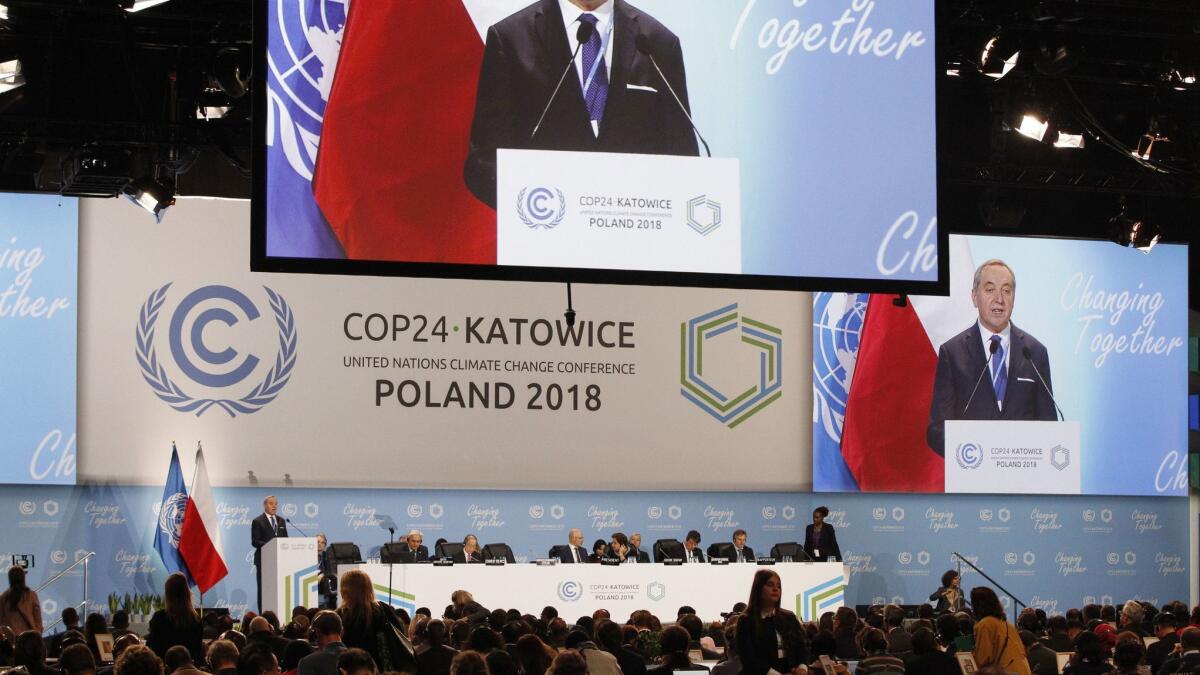Editorial: The world needs great strides to fight global warming. Climate talks in Poland delivered only baby steps

- Share via
On Saturday night, at the end of two weeks of meetings in Katowice, Poland, delegates from nearly 200 nations gave themselves a standing ovation for their accomplishments in combating climate change. But even though they no doubt worked very hard on a very difficult issue, the fact is that their enthusiastic self-congratulations were undeserved.
The steps taken in Poland were, as critics noted, too little, too late. “In the climate emergency we’re in, slow success is no success,” said Durwood Zaelke, president of the Institute for Governance and Sustainable Development.
Honestly, we’re not trying to disparage the scientists and diplomats who spend their lives trying to avert the looming catastrophe of climate change. But it is disheartening that the best the United Nations body — called COP24 — came up with was, in essence, a rulebook in which the participating nations will report, accurately and transparently, who is releasing how much greenhouse gas. The Katowice meetings did not lead to new agreements on the most pressing aspect of global warming — the fact that it is occurring even faster than had been expected, according to a recent and especially dire United Nations report. That study, like others before it, state in no uncertain terms that the goal established in the 2015 Paris agreement — to limit atmospheric carbon levels to less than 1.5 degrees Celsius over pre-industrial levels — is insufficient to save us from some of the more drastic effects of climate change. Without significant action, global temperatures will rise by up to 5 degrees Celsius by the end of the century, according to the U.N.’s World Meteorological Organization, likely causing massive upheaval from rising seas, extreme weather, collapsing food chains, droughts and floods.
Enter the Fray: First takes on the news of the minute from L.A. Times Opinion »
It is no help, of course, that President Trump has announced his intention to pull the U.S. from the Paris agreement in 2020 and has pursued policies to increase production and burning of coal, oil and natural gas. In fact, intransigence by U.S. and three other leading oil-producing nations — Russia, Saudi Arabia and Kuwait — kept the conference from fully embracing the dire climate report the U.N. issued weeks earlier.
It’s difficult to overstate the need for urgency in addressing climate change, from setting national limits backed by hard policies, to adopting carbon taxes and other market mechanisms that will reduce reliance on fossil fuels, to changing consumer habits. None of this will be easy, but failure to rise to this challenge will make the current generation culpable in the ecological disasters, human upheaval and collapsed ecosystems of the future. That’s not much to applaud about.
Follow the Opinion section on Twitter @latimesopinion or Facebook
More to Read
A cure for the common opinion
Get thought-provoking perspectives with our weekly newsletter.
You may occasionally receive promotional content from the Los Angeles Times.










